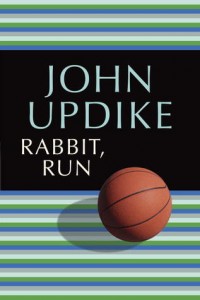All The Insight of a Rabbit
Updike, John (1960). Rabbit, Run. New York: Random House, 264 pp.
This is the first of the “Rabbit” tetralogy, and the book that established Updike as one of the greatest American novelists (and won a Pulitzer Prize). Harry Angstrom, nicknamed “Rabbit” for his twitchy nose, was a high school basketball star but at 26, an adult with an alcoholic wife and an infant son, he has a hard time coming to grips with the reality that he’s no longer a star, not a hero, not the center of attention, just an ordinary guy who demonstrates vegetable peelers in a department store. The novel is about Harry’s inability to deal with this existential panic, and to a lesser extent, about the angst and ennui of suburban life in 1950’s, post-war America.
The writing is luminous, with the kind of sentences you read over and over to absorb their beauty. Updike’s observations of the everyday are detailed, insightful, and thought-provoking. The way the scenes unfold is masterful. There is much to learn about the craft of writing here, for any writer. That’s why you read the book.
Another source of enjoyment is the time machine to a bygone America. Almost every scene is unintentionally nostalgic, including complaints about the new “supermarkets” putting corner groceries out of business, old TV shows, old cars, attitudes toward marriage, anxiety about sex, pregnant women drinking. It’s hard for me to accept that that’s now a distant historical period, but it is.
There isn’t much of a plot. The story is about ordinary domestic issues, strained marriages, sexual infidelity, social scandal, drinking, morality, parents, babies, in-laws. There are a couple of genuinely dramatic moments, but over all, this is a somewhat rambling character study, not a thriller, so don’t expect a driving plot.
Harry (“Rabbit”) is not a satisfying character. It becomes apparent early on that he is socially immature, hugely egocentric, impulsive, and not well-educated. He leaves such eddies of emotional and relationship wreckage in his wake, you would judge him to be psychopathic, except he is oblivious, and blind to himself. He does have moments of self-reflection, though these seem incongruent with the rest of his character. Overall, he is sometimes charming, but never a likeable character. Other characters are similarly shallow – not badly rendered by the author, but merely characterized as mind-numbingly dull and unimaginative, perhaps the way most ordinary people are, or at least were in the world Updike has constructed.
Updike has used the time-tested formula of presenting stupid people doing stupid things, because it’s easier for readers to understand unsubtle characters. Faulkner’s characters, by contrast, though dim-witted, are so nearly subhuman, a reader struggles to understand their actions. I do not engage well with dim-witted characters, so I always hope they will at least be amusingly funny or shockingly outrageous, or will be used to satirize some aspect of society. In this novel, I found it difficult to make a connection to any of the characters, except maybe Ruth, the prostitute. She seemed more genuine than the others.
To be clear, though, this cast is made of good, solid characters, coherent in themselves and distinct from each other. It’s just that they’re so ordinary, dull, and thick that there’s not much to be learned from observing them. The novel does nothing to add insight to the nature of life, love, or loss. The pleasure in reading this novel is to watch a master writer execute his craft. It’s a novel about John Updike.
I haven’t read the other three novels in the Rabbit series. People say this first one is the least polished, and that in subsequent novels, Rabbit becomes more developed and well-rounded. Unless he has an inexplicable infusion of intelligence, insight, and emotional maturity, it’s difficult to imagine that he will change much. If I read the subsequent novels, it will be to enjoy more of Updike, not Rabbit.

